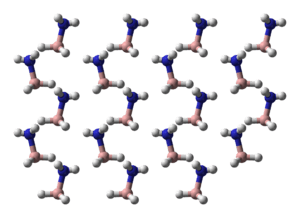Ammonia borane
 | |
| Names | |
|---|---|
| IUPAC name
Ammoniotrihydroborate | |
| Other names
Borazane | |
| Identifiers | |
| 13774-81-7 | |
| 3D model (Jmol) | Interactive image |
| ChemSpider | 371215 |
| ECHA InfoCard | 100.170.890 |
| PubChem | 419330 |
| |
| |
| Properties | |
| BNH 6 | |
| Molar mass | 30.865 g mol−1 |
| Appearance | Colorless crystals |
| Density | 780 mg mL−1 |
| Melting point | 104 °C (219 °F; 377 K) |
| Structure | |
| I4mm, tetragonal | |
| Tetragonal at B and N | |
| Tetrahydral at B and N | |
| 5.2 D | |
| Hazards | |
| R-phrases | R5 |
| S-phrases | S14, S15, S26, S36/37/39 |
| Related compounds | |
| Related compounds |
|
| Except where otherwise noted, data are given for materials in their standard state (at 25 °C [77 °F], 100 kPa). | |
| | |
| Infobox references | |
Ammonia borane (also systematically named amminetrihydridoboron), also called borazane, is the chemical compound with the formula H3NBH3. The colourless or white solid is the simplest molecular boron-nitrogen-hydride compound. It has attracted attention as a source of hydrogen fuel, but is otherwise only of academic interest.
Synthesis
Reaction of diborane with ammonia mainly gives the diammoniate salt [H2B(NH3)2]+(BH4)−. Ammonia borane is the main product when an adduct of borane is employed in place of diborane:[1]
- BH3(THF) + NH3 → BH3NH3 + THF
Properties and structure
The molecule adopts a structure like ethane, with which it is isoelectronic. The B-N distance is 1.58(2) Å. The B-H and N-H distances are 1.15 and 0.96 Å, respectively. Its similarity to ethane is tenuous since borane-ammonia is a solid and ethane is a gas: their melting points differing by 284 °C. This difference is consistent with the highly polar nature of ammonia borane. The H atoms attached to boron are hydridic and those attached to nitrogen are somewhat acidic.

The structure of the solid indicates a close association of the NH and the BH centers. The closest H--H distance is 1.990 Å, which can be compared with the H-H bonding distance of 0.74 Å. This interaction is called a dihydrogen bond.[2][3] The original crystallographic analysis of this compound reversed the assignments of B and N. The updated structure was arrived at with improved data using the technique of neutron diffraction that allowed the hydrogen atoms to be located with greater precision.

Uses
Ammonia borane has been suggested as a storage medium for hydrogen when the gas is used to fuel motor vehicles. It can be made to release hydrogen on heating, being polymerized first to (NH2BH2)n, then to (NHBH)n, [4] which ultimately decomposes to boron nitride (BN) at temperatures above 1000oC.[5] It is more hydrogen-dense than liquid hydrogen and also able to exist at normal temperatures and pressures.[6]
Ammonia borane finds some use in organic synthesis as an air-stable derivative of diborane.[7]
References
- ↑ Shore, S. G.; Boddeker, K. W. (1964). "Large Scale Synthesis of H2B(NH3)2+BH4− and H3NBH3". Inorganic Chemistry. 3 (6): 914–915. doi:10.1021/ic50016a038.
- 1 2 Klooster, W. T.; Koetzle, T. F.; Siegbahn, P. E. M.; Richardson, T. B.; Crabtree, R. H. (1999). "Study of the N-H···H-B Dihydrogen Bond Including the Crystal Structure of BH3NH3 by Neutron Diffraction". Journal of the American Chemical Society. 121 (27): 6337–6343. doi:10.1021/ja9825332.
- ↑ Boese, R.; Niederprüm, N.; Bläser, D. (1992). Maksic, Z. B.; Eckert-Masic, M., eds. Molecules in Natural Science and Medicine. Chichester, England: Ellis Horwood. ISBN 978-0135615980.
- ↑ Gutowski, M.; Autrey, T. (2006). "Features: Hydrogen gets onboard". Chemistry World. 3 (3).
- ↑ Frueh, S.; Kellett, R.; Mallery, C.; Molter; T.; Willis, W. S.; King'ondu, C.; Suib, S. L. (2011). "Pyrolytic Decomposition of Ammonia Borane to Boron Nitride". Inorganic Chemistry. 50 (3): 783–792. doi:10.1021/ic101020k.
- ↑ Stephens, F. H.; Pons, V.; Baker, R. T. (2007). "Ammonia–Borane: The Hydrogen Source par excellence?". Dalton Transactions. 2007 (25): 2613–2626. doi:10.1039/b703053c.
- ↑ Andrews, G. C. (2004). "Borane–Ammonia". In Paquette, L. Encyclopedia of Reagents for Organic Synthesis. New York: John Wiley & Sons. doi:10.1002/047084289.